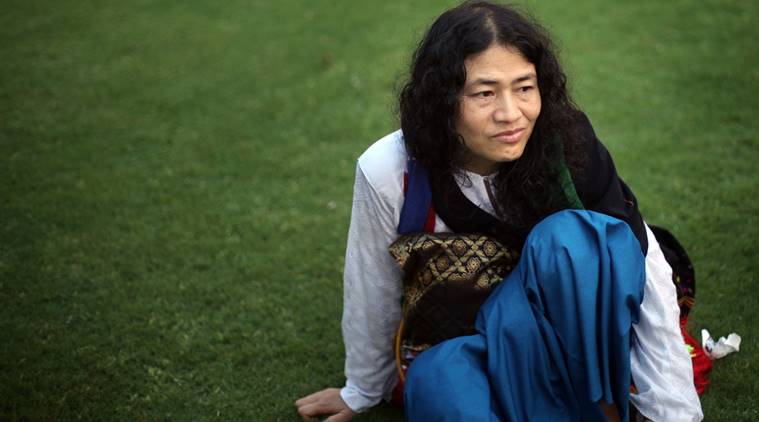No one doubts Irom Sharmila’s heroic resistance to AFSPA. But somewhere, she lost her bearings, confused moral strength with temporal power.

Watching Irom Chanu Sharmila — the woman who spent 16 years of her youth in a lonely special cell in an Imphal hospital while on a hunger strike against the draconian Armed Forces Special Powers Act (AFSPA), 1958 — humiliatingly dismissed from politics with just 90 votes while taking on the incumbent chief minister of Manipur, Okram Ibobi Singh, was very painful. Sad though this is, it must be said nobody in the state was in any doubt about what she was headed for. But Sharmila herself remained oblivious of the dark forebodings.
There is a genre in Manipuri traditional theatre, Shumang Lila (literally ‘courtyard plays’) called Ipom that borders on the farcical and the satirical. One of these plays has a joke that goes “Nakhon yam phei, pung thillu”. Literally translated, it means, “You have a good voice so take to drumming”. This translation does not have the punch of the original joke. But its message is simple: Being good at one thing does not necessarily make you good at everything. Sharmila, the simple, steadfast and courageous young woman, who took on the might of the state, developed a hubris large enough to make her ignore the message of this joke which she, like all ordinary Manipuris, would have heard at some time or the other.
Few people would doubt Sharmila’s contribution to the cause of Manipur and its people. They, however, were also never in doubt about her ability to be a good politician. The 90 votes she received were probably a form of NOTA, given not as an affirmation of Sharmila’s capabilities, but because the voters did not believe the promises made by the other parties.
Sharmila’s humiliating defeat, then, is certainly not a question of Manipuris ceasing to respect her or not being grateful for her superhuman contribution to their struggle. It was, instead, a statement acknowledging that politics is much more complex than a one-agenda resistance campaign. The elections were not just about liking or hating the AFSPA. People’s voting decisions are determined by issues pertaining to multiple insecurities, such as unemployment, falling standards of living, a drop in the quality of education and the existential threat to the state on account of deep divisions between ethnic communities — AFSPA is just one among several insecurities.
Sharmila’s tragic hubris, which did not allow her to foresee her defeat, can be understood from one perspective. She has been on a public pedestal for long and her 16-year struggle has deservingly earned her a reputation of moral invincibility. But in her loneliness, she has had no strong or honest critics amongst those close to her, who could shape her approach to life outside the hospital cell. Somewhere, she lost her bearings and confused moral strength with temporal power.
It is difficult not to recall a rather wicked quip by V.S. Naipaul in an interview to an Indian weekly in the wake of the fatwa on Salman Rushdie issued by Iran’s Ayatollah Khomeini in 1989 after the publication of The Satanic Verses. The Nobel laureate for literature said the fatwa was a severe form of literary criticism.
The cynicism notwithstanding, in the case of Sharmila too, the only real criticism she has had to face since she decided to end her fast and join politics was of a severe kind from her long-time supporters. These elderly women of the Sharmila Kanba Lup (Save Sharmila Campaign) were outraged and even went about physically obstructing her movements after her release on August 9, 2016. In an interview I had with her, much later, Sharmila said she made up with her former supporters in a community feast, and it was agreed they would part ways, campaign against the AFSPA in their own ways.
That “criticism” was startling, but Sharmila has had no other criticism to test the merit of her decisions, and therefore remained blind to messages of caution. She, instead, was nudged by many into believing that she was invincible. One of her major influences is her boyfriend, an NRI of Goan origin with very condescending opinions of Manipur and Manipuris. He extracted a power of attorney from her that he will be the sole spokesperson and arbitrator of her decisions, and posted the document on social media. This association could have turned many more of Sharmila’s supporters against her. Sharmila ought to have also been advised that some aspects of a public personality’s private life need to be kept away from public political space.
But there was also an adulating horde, which often deified her in social media or expressed moral solidarity with her struggle, and often vilified those around her. They too are responsible for the hubris which pushed Sharmila into contesting, not from her home constituency, Khurai, but from Thoubal which meant taking on Ibobi Singh on his own turf. Sharmila has now declared she would not be contesting elections, but would continue to be the moral backbone of her party, People’s Resurgence and Justice Alliance (PRJA). This declaration can only be good for her and the PRJA’s future. Sharmila is a non-violent resister par excellence but a very naïve politician.
Phanjoubam is editor, ‘Imphal Free Press’and author of ‘The Northeast Question: Conflicts and Frontiers’
Source: Indian Express


